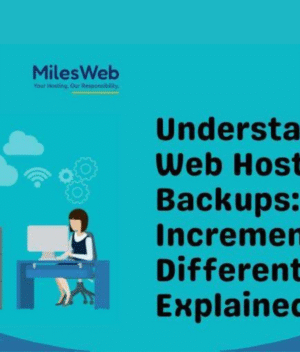Understanding Web Hosting Backups: Full, Incremental, and Differential Explained
Every website must prioritize data security without exception. Every piece of your website is valuable, from your cheap hosting provider to content, customer data, configurations, and databases. Unfortunately, the loss of data is one of the most prevalent and expensive issues website owners experience.
Web hosting backups are designed to address losses and ensure the website owner is able to recover the website. They are invaluable to recovering from accidental deletions, hacking, or server failures.
Backups offer you a safety net and flexible online business options within your hosting plan prices. The crucial difference between full, incremental, and differential backups will help you in determining the most suitable plan for your protection level.
What Is a Full Backup?
Full backups are the most comprehensive backups. It makes a complete copy of your entire website, which includes files, databases, emails, and configuration, at a particular time.
This option is perfect for anyone looking to have a complete snapshot of a website. The benefit is obvious—those who go full can just revert to a complete version if anything goes wrong. A full backup requires more time and range in order to cycle through all the data.
What Is an Incremental Backup?
Incremental backups only save new or changed data since the last backup, and that last backup can be either incremental or full. If you save new files or change some posts on a blog, the incremental backup will only back up the new files. This is one of the reasons why incremental backups save more storage space as opposed to full backups.
Restoring data with incremental backups is more complicated, as the system will have to use multiple backup sets to recreate the most current version of the site. This form of backup works best for a dynamic, regularly changing, or updated site, like an e-commerce site or a blog.
What Is a Differential Backup?
Differential backups bridge the gap between full backups and incremental backups by saving all data that has changed since the last full backup, as opposed to just the last incremental backup.
As time passes, each differential backup progressively enlarges, though they remain faster to restore than incremental backups because there are fewer steps during restoration.
Differential backups are well liked because they provide an appropriate combination of speed, efficiency, and reliability, which for most business websites makes them the right choice.
What Backup Type Should You Go With?
Your website’s size, the frequency of updates, and the amount of storage you have will determine the most appropriate backup method. Small websites and static business websites will most likely benefit from full weekly backups, which provide an easy and reliable copy to access.
Blogs and medium-sized websites with more regular updates will likely appreciate an efficiency standpoint more if you use a combination of full and incremental backups.
Because large dynamic websites and e-commerce websites change frequently and require fast restore capabilities, they are most likely to benefit from differential backups.
To provide you with the security of knowing you will never lose critical data and the speed to access it, smart hosting providers will combine these approaches.
The Importance of Regular and Instant Backups.
Regardless of the backup type, frequency and reliability are most critical. Having backups done daily and instantly is especially important for data-heavy and high-traffic websites to minimize the loss of essential updates.
That’s why selecting a host that incorporates instant and daily automatic backups is fundamentally important. You wouldn’t like to wait until the end of the week to recover a website that crashed today. With instant backups, you can restore a website in a matter of minutes, improving the efficiency of your business and avoiding costly downtime.
The Human Error Factor
Loss of data is not always due to malicious activity or the breakdown of hardware. Human error is also a factor, and in some cases, it is a website data loss mistake, like deleting files, overwriting a database, or reconfiguring a website.
Regular automated backups alleviate the error recovery process. With daily backups, recapturing a website is a breeze. You won’t have to troubleshoot for hours to recover lost content, as the system allows you to return to the last functional version.
Beyond Backup: Why Email Reliability Matters Too
Equally critical is email communication. Many hosting companies provide free email accounts for only the first year of service, after which you have to pay for email hosting accounts.
This is obviously frustrating and expensive. With MilesWeb hosting, businesses receive free email accounts for life, which means communication is not lost and there are no renewal fees.
Having a professional identity can be more important through custom business emails like info@yourdomain.com.
Final Thoughts
Having backups is a necessary feature for your business, essentially functioning as your website’s insurance policy. Selecting a hosting provider who understands this and can save your business from avoidable disasters can be a crucial step.
MilesWeb provides more than the basic services regarding backups by giving you the peace of mind of instant and daily backups to ensure no matter what happens, your website data can always be restored. The additional benefits of free email accounts and support whenever you need it mean that it is possible to scale your business without the fear of losing data or communication.
Every business, be it a small startup or a larger one, should understand the available options for backups, as it is always safer to be prepared. With your online presence, it is always better to prevent than to cure.





